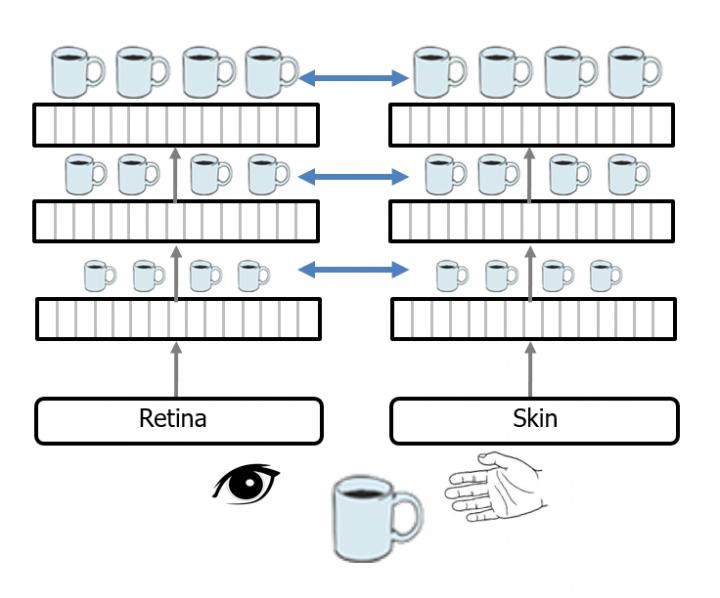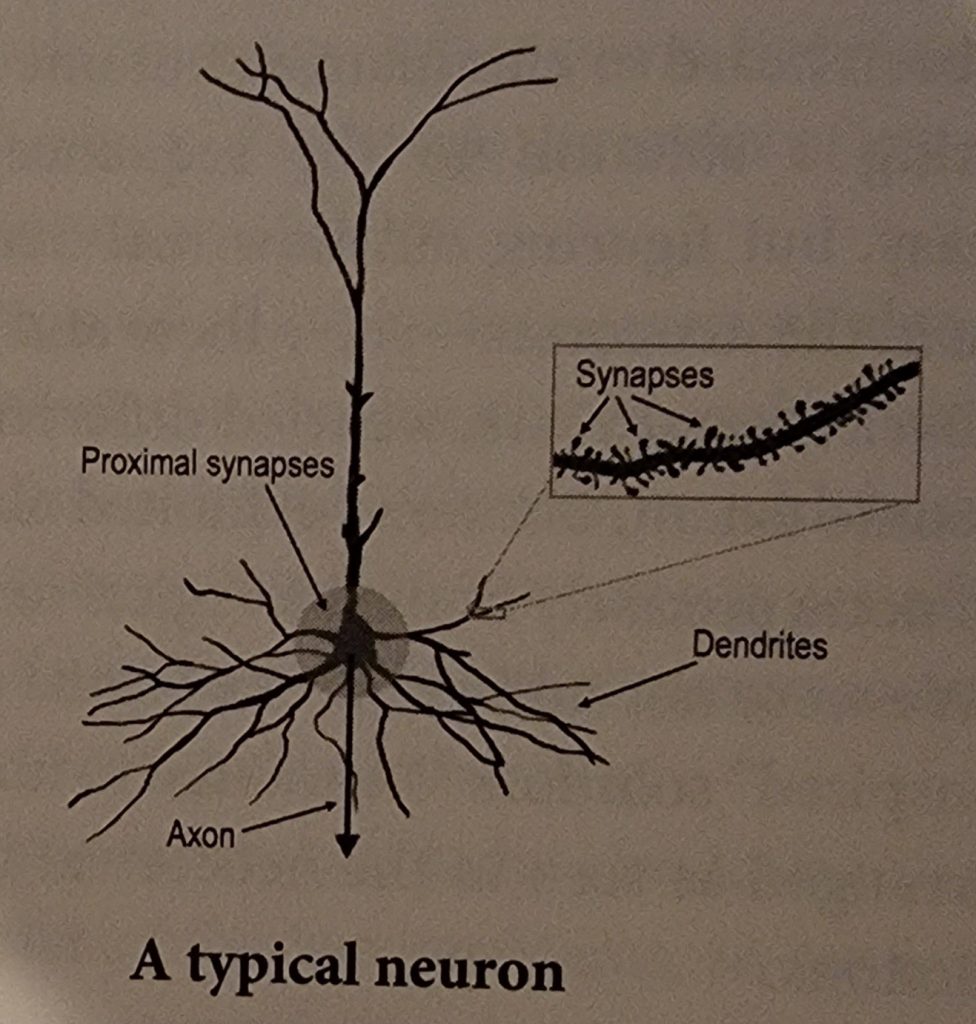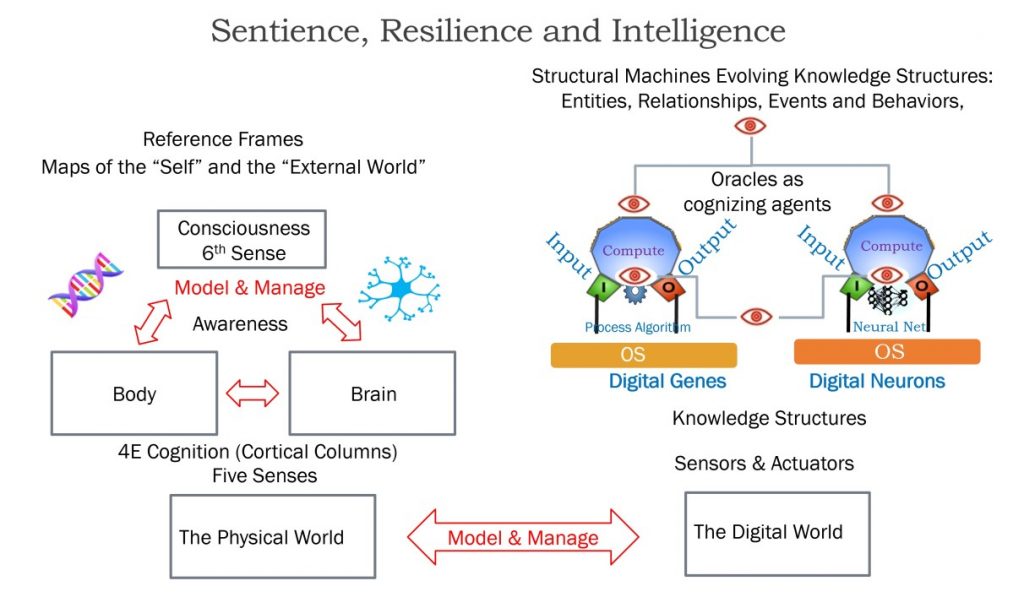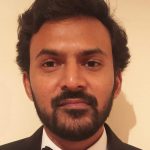A Thousand Brains – A New Theory of Intelligence
Jeff Hawkins
……Exciting, A Whole New (Different) Perspective
As you have seen many people use an Analogy “Either the thought is from your heart or brain”, but after reading this book, I am sure “THE THOUGHT” is either from your old brain or new brain. Usually the decisions from Old brain are known as Heart.
Ideally the tussle is between your Old and the New Brain (Neocortex), not between Heart and Mind.

The concepts in the book are “Some Practical, Some Philosophical”. Hence it is easy to get carried away thinking the Philosophies are true, and it’s because of the compelling logical reasons presented. As a reader, it is very important to be not biased by opinions but see it in practical light.
Having said that, Mr. Hawkins’s book will help you look things from a different perspective and will open your mind. Examples in this book are like brain twisters and it’s really fun to read.
The book is easy to follow.
I always believed in the idea that to have intelligent machines, we need to know exactly how human brain functions & then replicate it. This is exactly the case that’s presented in the book. However, considering today’s technology, we are very far behind.
Sometimes the biggest ideas are the simplest things. They are missed by most people, because they are too simple.
The book starts with making distinction between old and the new brain i.e. Gene’s vs Knowledge.
Then it goes onto explain that our brain creates models of the world using reference frames. Look at Google Maps.
Within our New Brain aka Neocortex, there are thousands of replica of information (Hence the book names A Thousand Brains).

Part 2 of the book explains Machine Intelligence and why there is no “I” in “AI”. Obviously, this does not mean that machines won’t be intelligent however it will still take sometime.
There are views presented on whether machines will take care over human race but this possibility is not there as per Mr. Hawkins. There are vivid examples presented to explain this.
Part 3 talks about a whole new concept of human intelligence. Differentiation has been done between Gene’s and Knowledge. It’s the first time I am hearing in this fashion. Mind Boggling.
Old Brain displays some innate behavior (developed over Millions of years) for our survival and it does not care about accumulated knowledge. New Brain has learnt a lot in the last thousand+ years and have accumulated knowledge. Usually in the tussle between Evolution and Gene, Gene wins, however New brain with it’s knowledge has developed some ways to manipulate Old brain. See this example:
Old Brain focuses on Gene replication and doesn’t care about human race survival, as Gene can be replicated in other species. However, with the knowledge we have gathered, we are working towards saving our evolution and our Human Race.
There are many more case studies mentioned in the book. I will end my review here, but I know I have not even done 10% justice. I will recommend you reading this book.

For more details, I am including an extract/ summary from the book.
FINAL THOUGHTS
I have a vision that never ceases to entertain me. I imagine the vast universe, with its hundreds of billions of galaxies. Each galaxy contains hundreds of billions of stars. Around each star, I picture planets of limitless variety. I imagine these trillions of monstrously sized objects slowly orbiting each other in the vast emptiness of space for billions of years. What amazes me is that the only thing in the universe that knows about this-the only thing that knows that the universe exists at all-is our brain. If it wasn’t for brains, then nothing would know that anything exists. It prompts the question that I mentioned at the beginning of the book: If there is no knowledge of something, can we say that the thing exists at all? That our brain plays such a unique role is fascinating. Of course, there may be intelligent beings elsewhere in the universe, but this makes it even more entertaining to think about.
Thinking about the universe and the uniqueness of intelligence is one of the reasons I wanted to study the brain. But there are plenty of other reasons right here on Earth. For example, under standing how the brain works has implications for medicine and mental health. Solving the brain’s mysteries will lead to true ma chine intelligence, which will benefit all aspects of society in the same way that computers did, and it will lead to better methods of teaching our children. But ultimately, it comes back to our unique intelligence. We are the most intelligent species. If we want to un derstand who we are, then we have to understand how the brain creates intelligence. Reverse engineering the brain and under standing intelligence is, in my opinion, the most important scien tific quest humans will ever undertake.
When I started on this quest, I had a limited understanding of what the neocortex did. I and other neuroscientists had some notions about the brain learning a model of the world, but our notions were vague. We didn’t know what such a model would look like or how neurons could create it. We were awash in exper imental data and it was difficult to make sense of the data without a theoretical framework.
Since that time, neuroscientists around the world have made significant progress. This book focuses on what my team has learned. Much of it has been surprising, like the revelation that the neocortex doesn’t contain one model of the world but abour 150,000 sensory-motor modeling systems. Or the discovery that everything the neocortex does is based on reference frames.
In the first part of this book, I described the new theory of how the neocortex works and how it learns a model of the world. We call this the Thousand Brains Theory of Intelligence. I hope my exposition was clear and that you found my arguments compel ling. At one point I debated whether I should end right there. A framework for understanding the neocortex is certainly ambitious enough for one book. However, understanding the brain naturally leads to other issues of consequence, so I kept going.

In Part 2, I argued that today’s AI is not intelligent. True intelligence requires machines to learn a model of the world the same way the neocortex does. And I made the case for why machine intelligence is not an existential risk, as many others believe. Ma chine intelligence will be one of the most beneficial technologies we will ever create. Like every other technology, there will be peo ple who abuse it. I worry more about that than AI itself. On its Own, machine intelligence does not represent an existential risk, and the benefits, I believe, will be far greater than the downsides.
Finally, in Part 3 of the book, I looked at the human condition through the lens of intelligence and brain theory. As you can probably tell, I am concerned about the future. I am concerned about the welfare of human society and even the long-term survival of our species. One of my goals is to raise awareness of how the com bination of the old brain and false beliefs is a real existential risk, far greater than the presumed threat of AI. I discussed different ways we might reduce the risks we face. Several of them require that we create intelligent machines.
I wrote this book to convey what my colleagues and I have learned about intelligence and the brain. But beyond sharing this information, I hope to convince some of you to act on it. If you are young or contemplating a career change, consider entering the fields of neuroscience and machine intelligence. There are few subjects more interesting, more challenging, and more import ant. However, I must warn you; it will be difficult if you want to pursue the ideas that I wrote about in this book. Both neuro science and machine learning are large fields with tremendous inertia. I have little doubt that the principles I described here will play central roles in both areas of research, but it might take years to happen. In the meantime, you will have to be determined and resourceful.
I have one more ask, which applies to everyone. I hope that one day every person on Earth will learn how their brain works. To me, this should be an expectation, like, “Oh, you have a brain? Here is what you need to know about it.” The list of things every one should know is short. I would include how the brain is com posed of the new part and the older parts. I would include how the neocortex learns a model of the world, whereas the older parts of the brain generate our emotions and more primitive behaviors. I would include how the old brain can take control, causing us to act in ways we know we shouldn’t. And I would include how all of us are susceptible to false beliefs and how some beliefs are viral.
I believe everyone should know these things, in the same way that everyone should know that the Earth orbits the Sun, and that DNA molecules encode our genes, and that dinosaurs lived on Earth for millions of years but are now extinct. This is important Many of the problems we face-from wars to climate change-are created by false beliefs or the selfish desires of the old brain or both. If every human understood what was going on in their head, I believe we would have fewer conflicts and a sunnier prognosis for our future.
Each of us can contribute to this effort. If you are a parent, teach your children about brains in the same way you might hold up an orange and apple to teach your children about the solar system. If you write children’s books, consider writing about the brain and beliefs. If you are an educator, ask how brain theory can be included as part of a core curriculum. Many communities now teach genetics and DNA technologies as a standard part of their high school curricula. I believe brain theory is equally if not more important.
What are we?
How did we get here?
What is our destiny?
For millennia, our ancestors have asked these fundamental questions. This is natural. We wake up and find ourselves in a complex and mysterious world. There is no instruction manual to life and no history or backstory to explain what it is all about. We do our best to make sense of our situation, but for most of human history, we have been ignorant. Beginning a few hundred years ago, we started answering some of these fundamental questions We now understand the chemistry underlying all living things. We understand the evolutionary processes that led to our species.
And we know that our species will continue to evolve and will likely become extinct sometime in the future. Similar questions can be asked about us as mental beings.
What makes us intelligent and self-aware?
How did our species become intelligent?
What is the destiny of intelligence and knowledge?
I hope I have convinced you that not only are these questions answerable, but we are making excellent progress in answering them. I hope I have also convinced you that we should be con cerned about the future of intelligence and knowledge, indepen dent of our concern about the future of our species. Our superior intelligence is unique, and as far as we know, the human brain is the only thing in the universe that knows the broader universe ex ists. It is the only thing that knows the size of the universe, its age, and the laws by which it operates. This makes our intelligence and knowledge worthy of preservation. And it gives us hope that one day we may understand everything.
We are Homo sapiens, the wise humans. Hopefully, we will be wise enough to recognize how special we are, wise enough to make the choices that ensure our species survives as long as possible here on Earth, and wise enough to make the choices that ensure that in telligence and knowledge survive even longer, here on Earth and throughout the universe.
That’s it Folks! Let me know what you think about the blog. Please post for any comments, questions. I can also be reached at LinkedIn, Twitter, Facebook.
A enthusiast technical blogger, speaker, writer and have an interest in learning & sharing new capabilities.
I work as a Digital Workplace Consultant, with a primary focus on Microsoft Teams, Cisco Telephony, Zoom, Office 365, Azure.
Like to talk about #FutureOfCollaboration #AgileManagedServices #AI, #UCAAS #WorkplaceTransformation #HybridWorkplace #WXC #TimeManagement #Productivity
Professionally, I am an Experienced Digital Communication and Workplace Transformation Consultant.
Total Experience of over 10 years. Currently leading a UC Presales Team and based out of London, UK. Responsible for consulting EN and NN customers on:
• Continued Innovation & Automation potential by data analytics.
• Solution transformation or Platform Harmonization approach.
• Potential of transforming traditional Managed Operations to Next Gen Agile Ops.
• Helping customers understand importance of experience transformation(CX) and technology adoption.
Apart from this, I have interests in Spirituality, Finance & Investments, Physical Sports and currently based out of London, UK.

